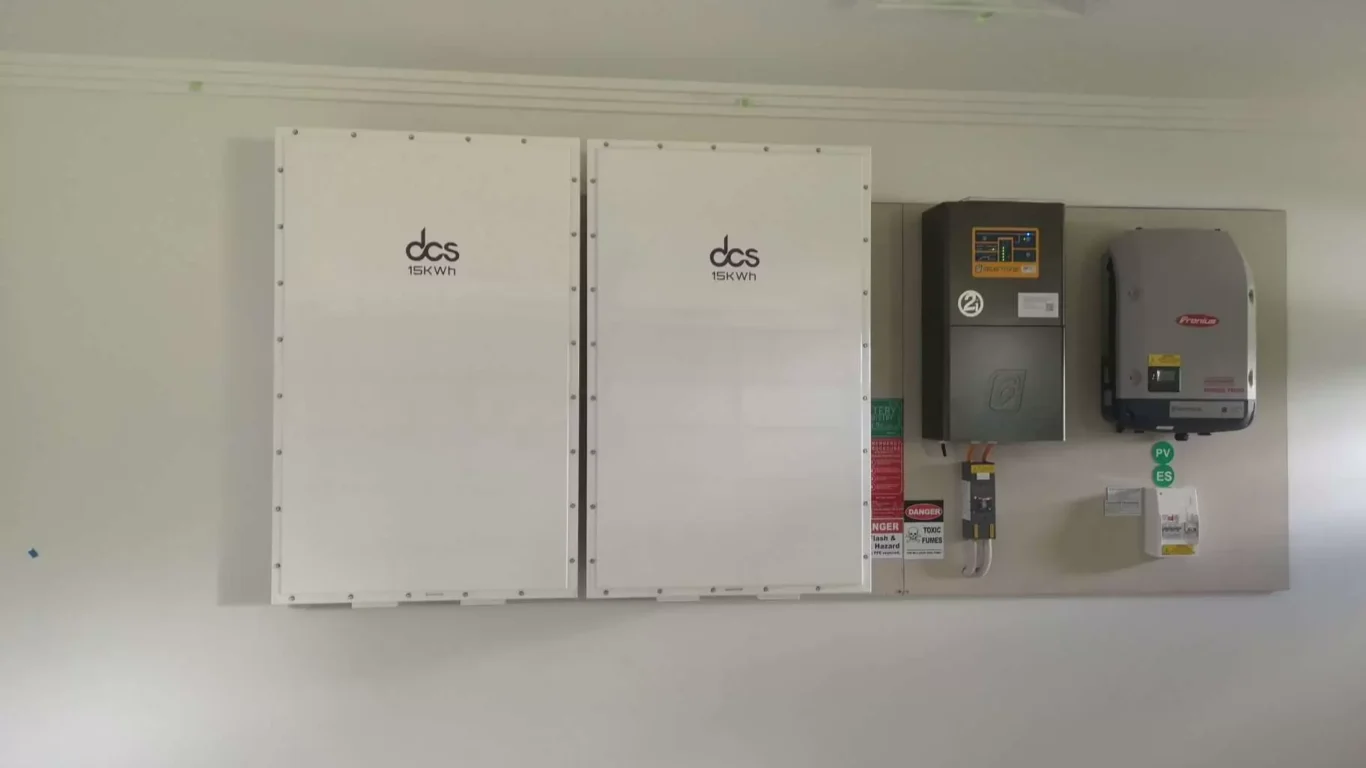Lithium Ion Solar Batteries: Future of Energy Storage

In recent years, the demand for sustainable energy solutions has increased, increasing the popularity of solar power systems. One key component of these systems is energy storage, and lithium-ion solar batteries have emerged as a leading technology in this field. This blog post will explore the reasons why lithium ion solar batteries are considered the future of energy storage.
Introduction To Lithium- Ion Solar Batteries
Lithium-ion solar batteries are a class of rechargeable batteries that have gained prominence for storing solar-generated energy. These batteries distinguish themselves through their superior energy density, which allows for a compact size while storing large amounts of energy.
The preference for lithium-ion technology over other battery types stems from its dependable performance and ability to meet the demanding energy storage needs of modern solar installations.
Role Of Batteries In Solar Energy Systems
In solar energy systems, batteries serve a critical function by ensuring that the excess electricity generated during daylight hours is not wasted but stored for future use. This storage capability is vital when sunlight is scarce or during night-time, guaranteeing a steady and dependable electricity supply.
By doing so, solar energy systems become more than just a daytime power source; they transform into comprehensive solutions that can provide round-the-clock power. This seamless supply of electricity is essential for both off-grid systems, which rely solely on solar power, and grid-tied systems that aim to reduce dependence on traditional energy sources.
Lithium-ion solar batteries, with their high energy density and long service life, are especially well-suited to meet these storage demands. They ensure that solar energy remains a viable and reliable energy source throughout varying conditions.
Comparing Lithium Ion To Other Solar Battery Types
When examining the landscape of solar energy storage options, lithium-ion batteries emerge as significantly more advantageous than their counterparts, notably lead-acid and nickel-cadmium batteries. Lithium-ion units offer a more impressive energy density, enabling them to store more electricity in a smaller physical footprint, an essential attribute for space-constrained installations.
Additionally, these batteries boast a longer lifespan, often exceeding a decade with proper maintenance, contrasting sharply with the shorter life expectancies of alternative battery types. Their rapid charging capability further sets them apart, facilitating quicker energy storage and availability.
Unlike lead-acid batteries, which demand regular upkeep to maintain efficiency and longevity, lithium-ion variants require minimal maintenance, reducing long-term care costs. Moreover, their eco-friendly profile, attributed to fewer replacements and a lower environmental burden, aligns with the sustainable ethos of solar power systems. This comparison elucidates why lithium-ion batteries are preferred for contemporary solar energy storage needs.
Advantages Of off grid solar batteries
Off grid solar batteries provide a high energy density, which is crucial for off-grid systems with limited space. This feature allows for storing significant amounts of energy in a compact setup.
Longer Lifespan
These batteries typically offer a longer operational life, reducing the need for frequent replacements. This longevity is particularly beneficial for off-grid installations, where reliability over many years is paramount.
Rapid Charging
Charging quickly is essential for off-grid systems, especially during periods of limited sunlight. Lithium-ion batteries excel at fast charging, ensuring energy is readily available.
Reduced Maintenance
Unlike other battery types, lithium-ion batteries require minimal maintenance, making them ideal for off-grid applications where regular upkeep might be challenging.
Eco-friendly Option
Lithium-ion batteries have a lower environmental impact over their lifecycle than alternatives, supporting the sustainable ethos of off-grid solar systems.
Dependability in Diverse Conditions
These batteries are known for their reliable performance across various temperatures and conditions, critical for off-grid systems in remote or harsh environments.
Understanding The Lifecycle Of Lithium- Ion Solar Batteries
The life cycle of lithium-ion solar batteries encompasses several critical stages, beginning with their intricate manufacturing process. This process involves assembling sophisticated components designed to optimise energy storage and output.
Following manufacturing, these batteries are deployed in various applications, where they undergo numerous charge and discharge cycles, contributing to the efficient storage and supply of solar-generated electricity.
Over time, lithium-ion batteries may gradually diminish in performance, leading to a decrease in their capacity to store energy. At this juncture, responsible disposal practices become paramount. Recycling initiatives play a pivotal role, ensuring that valuable materials are reclaimed and repurposed, thereby minimising the environmental footprint associated with the disposal of these batteries.
Environmental Impact Of Off Grid Batteries For Solar
Lithium-ion batteries stand as a more eco-conscious choice among energy storage options, but their production and end-of-life disposal pose environmental challenges. The extraction of lithium and other critical minerals necessary for off grid batteries for solar involves processes that can lead to ecological degradation, including water pollution and habitat disruption.
Despite these concerns, strides in recycling technologies and the development of more sustainable mining practices are beginning to reduce the ecological footprint of lithium-ion batteries. Efforts are underway to ensure that the materials used in these batteries are sourced more responsibly and that end-of-life batteries are recycled efficiently, aiming to curtail the negative environmental impacts associated with their lifecycle.
Maintenance And Care For Lithium- Ion Solar Batteries
It is essential to conduct periodic visual inspections to check for any signs of damage or wear, ensuring the battery’s housing and connections remain secure and intact.
Optimal Charging Practices
Adhering to manufacturer-recommended charging guidelines helps preserve battery health, avoiding overcharging or deep discharging, which can shorten the battery’s lifespan.
Temperature Control
Keeping lithium-ion batteries at a stable temperature, away from extreme cold or heat, optimise their performance and longevity.
Cleanliness
Dust and debris can accumulate and potentially interfere with connections; thus, it is crucial to maintain cleanliness around the battery area.
Firmware Updates
Ensuring your battery’s management system firmware is up-to-date for systems that support it can improve performance and efficiency.
Professional Health Checks
Engaging a professional for annual health checks can diagnose potential issues early, helping to maintain the battery’s optimal functioning.
Cost Analysis Of Lithium- Ion Solar Batteries
Whilst the initial outlay for lithium-ion batteries may seem steep compared to alternative storage options, their economic efficiency becomes apparent over time. Their durability and reduced maintenance needs mean fewer replacements and lower ongoing costs.
This aspect is especially beneficial for long-term energy storage solutions, where the overall investment is amortised over many years, ultimately making lithium-ion batteries a financially viable option. Furthermore, the energy efficiency of lithium-ion technology contributes to operational savings, making them a judicious selection for those invested in sustainable energy systems.
Installation Considerations For Lithium- Ion Solar Batteries
Proper space allocation is paramount for installing lithium-ion solar batteries, ensuring adequate room for ventilation and future expansion if necessary.
Ventilation and Temperature Control
Batteries perform best in controlled environments; thus, proper ventilation and temperature regulation within the installation space are crucial to maintaining optimal battery efficiency and longevity.
Electrical Configuration
Attention to the electrical setup, including the integration with solar panels and the power grid, if applicable, is necessary to maximise the system’s performance and safety.
Mounting and Securing
Batteries must be securely mounted to withstand environmental stresses and ensure they remain stable and operational under various conditions.
Compliance with Local Regulations
Adherence to local building codes and electrical standards is essential to ensure safety and legal compliance, and it requires consultation with local authorities or a professional installer.
Accessibility for Maintenance
While lithium-ion batteries require minimal maintenance, easy access should be ensured for periodic checks or necessary servicing to maintain the system’s reliability and efficiency.
Future Outlook For Lithium Ion Batteries
The trajectory for lithium-ion batteries in renewable energy storage looks increasingly promising. Technological advancements and enhanced manufacturing techniques are set to render these batteries more economical, efficient, and eco-friendly than ever before. This evolution is expected to bolster their adoption in solar power systems and across a spectrum of applications demanding reliable energy storage solutions.
The continuous improvement in lithium-ion batteries’ performance attributes signifies their pivotal role in propelling the global shift towards more sustainable energy practices. As the integration of renewable energy sources accelerates, lithium-ion batteries stand at the forefront, heralding a new era of energy storage.
Future Trends In Lithium Ion Battery Technology
Anticipated advancements in lithium-ion battery technology are set to redefine the parameters of efficiency and sustainability in energy storage. Experts are delving into novel materials and cutting-edge designs that promise to enhance energy density, significantly improve the speed of charging, and extend the operational lifespan of these batteries.
Developing more sustainable manufacturing processes and reducing the ecological footprint of battery production are key focal areas. Additionally, there is an ongoing exploration into alternative chemistries that could lower costs and minimise reliance on rare minerals.
Such innovations are critical in ensuring that lithium-ion batteries remain at the forefront of the renewable energy sector, poised to meet the evolving demands of global energy storage with increased effectiveness and reduced environmental impact.
Choosing The Right Lithium Ion Battery For Your Solar System
When selecting a lithium-ion battery for a solar system, several key factors must be assessed. The site’s energy requirements, spatial limitations, and financial constraints all play pivotal roles in this decision-making process.
Additionally, it is advisable to engage with a professional installer or consultant to navigate the multitude of options available. This ensures the chosen battery aligns perfectly with the specific energy demands and the architectural nuances of the installation site, thereby optimising performance and providing seamless integration into the solar energy system.
Conclusion
To summarise, the ascendancy of lithium-ion solar batteries within the realm of solar power systems signals a significant shift towards more sustainable energy practices. Their unparalleled energy storage capacity, durability, and minimal environmental impact underscore their pivotal role in advancing solar energy solutions. As technology progresses, off grid solar batteries are poised to become even more efficient, affordable, and environmentally friendly, cementing their status as the preferred choice for various applications.
FAQs
Are Lithium Ion Batteries Considered Safe For Residential Settings?
Yes, when installed and managed correctly, these batteries are deemed safe for domestic use, although it is recommended to adhere to safety guidelines and seek professional advice.
What Is The Typical Lifespan Of Lithium Ion Batteries In Solar Systems?
These batteries have a potential longevity of up to 10 years or beyond, influenced by the manner of usage and the level of maintenance provided.
Is It Possible To Recycle Lithium Ion Batteries?
Recycling programmes are available to reclaim valuable components from these batteries, helping diminish the environmental footprint.
Do Lithium Ion Batteries Fit The Needs Of Off-Grid Solar Systems?
Owing to their superior energy density, durability, and swift charging abilities, they are exceptionally suitable for such applications.
What Factors Affect The Cost Of off grid solar batteries?
Various factors, including capacity, brand, and additional features, impact the price, though their longer-term economic benefits offset the initial higher investment of off grid solar batteries.
| Related Business Listings |
| Contact Directory |
| Local Business Profiles |



